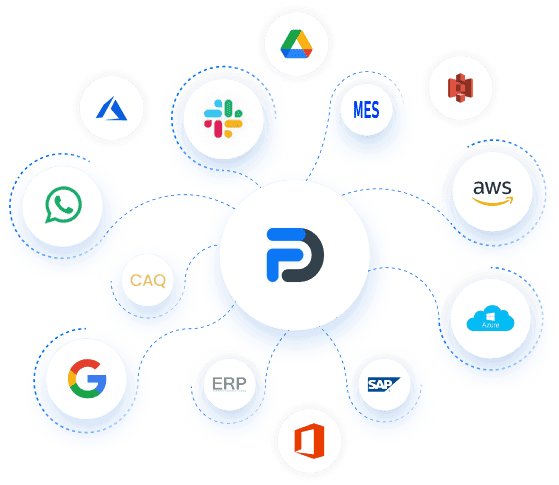-
EQMS Software - AI-Powered Electronic Quality Management System
EQMS Software - AI-Powered, Audit-Ready, and Compliant
flowdit’s AI-powered EQMS software helps you stay compliant, audit-ready, and fully in control of your quality processes - all in one smart platform.


Chosen by the Teams That Keep Operations Running
Explore our Electronic Quality Management System in Just 2 Minutes
Still using spreadsheets to manage quality? It’s easy to lose track - of documents, responsibilities, and what’s really compliant. And when an audit hits, that chaos shows. flowdit optimizes your workflows, automates routine tasks, and ensures you're always audit-ready.
Compliance Made Simple
Automate Quality Audits
Enhance the efficiency of your compliance process with real‑time quality audits. Effortlessly manage documentation, track compliance, and avoid expensive errors - all within one powerful platform.



Mitigate Risks Early
Identify and Resolve Issues Fast
Find problems quickly with real-time information and tools that help you fix them before they escalate. Improve efficiency, reduce errors, and keep your quality management on track.
Actionable Insights
Leverage Real-Time Data
Use real-time dashboards to turn raw data into actionable insights. Make informed decisions quickly to enhance your quality management processes.



Team Collaboration
Centralize Team Communication
Boost collaboration by centralizing communication. From one place, you can share updates, assign tasks, and make ensure everyone is on the same page about quality expectations.
Scalable for Growth
Adapt to Changing Needs
Our flexible platform grows with your business. Whether you're a small team or an enterprise, flowdit adapts to meet your evolving quality management requirements.

All in one EQMS platform for all your
quality management needs
Non-Conformance Management
Standardize Procedures
Risk & Supplier Management
Quality Assurance
Management & Traceability
Issue Tracking & Resolution
Audits & Inspections
ISO Compliance
Efficiency Improvements
Document & Version Control
Preventive Maintenance
Root Cause Analysis
CAPA Management
Training Management
Reporting & Analytics
Perfect fit for every team
Get started fast with out-of-the-box solutions.
Easily customize flowdit as team needs grow!
CONSTRUCTION
flowdit enhances efficiency, reduces delays, boosts productivity, ensures safety.
Project Manager
Granted Works Contractors
LOGISTICS
flowdit unifies operations, boosts efficiency, and enhances team collaboration.
Operations Manager
Loadtrack Logistics
ENERGY
flowdit streamlines processes, boosts efficiency, and empowers innovation.
Sun Horizon Energy Solutions
AVIATION
flowdit transforms operations, ensuring clarity, adaptability, and team alignment.
Chief Operations Officer
SkyTrack Aviation Services
MANUFACTURING
flowdit enhances efficiency, ensures compliance, simplifies processes, and saves time.
Quality Assurance Manager
IronEdge Fabrications
Integrated Tools for Quality Excellence
flowdit works with the best ERPs, CRMs, and project management software to simplify quality management workflows and ensure top-notch performance.

Excellence in Quality Management with flowdit eQMS
Transform the way your team works - today.
Simplify processes, stay aligned with every standard, and drive efficiency with flowdit’s all-in-one platform. Power your operations today.

Got questions?
Frequently Asked Questions
What is an Electronic Quality Management System (eQMS)?
An eQMS, or electronic Quality Management System, is a digital quality solution that helps a company centralize and streamline all of its quality-related data and processes. By automating workflows, it replaces traditional paper-based quality management systems, enhancing efficiency and consistency in quality management while simplifying the implementation of Total Quality Management (TQM).
eQMS software is used by sectors like manufacturing, pharmaceuticals, consumer goods, and medical devices to maintain high-quality outputs, enhance operational workflows, and guarantee regulatory compliance. Core functionalities typically include document management, corrective and preventive actions (CAPA), risk assessment, audit management, and compliance tracking.
Implementing an eQMS within the organization helps quality teams manage their quality management processes effectively, improve operational efficiency, and produce consistent quality products that conform with industry standards and regulatory requirements.
How is an eQMS different from a paper-based or traditional QMS?
A QMS, or Quality Management System, often uses manual processes to codify policies, workflows, and procedures designed to ensure consistent quality. This frequently includes traditional paper-based quality control methods or decentralized systems, which can contribute to inefficiencies.
An eQMS, on the other hand, is an electronic quality management system that aims to provide a single source of truth by consolidating all quality procedures and compliance data onto a simplified platform. eQMS makes managing quality data simpler by automating tasks like non-conformance tracking, corrective actions, and document control.
For a full comparison, see our article on eQMS vs QMS.
An eQMS has additional features including real-time analytics and integration capabilities, which help firms satisfy quality requirements more effectively while also enabling compliance management. It can also adapt to a wide range of software requirements, providing flexibility and scalability for enterprises with changing needs.
When should I consider switching to an eQMS like flowdit?
If you're spending more time preparing for audits than increasing quality, or if you're dealing with inconsistent processes across teams or sites, it's time. flowdit assists enterprises in modernizing, scaling, and eliminating compliance issues.
What key features are included in flowdit’s eQMS?
- Document & version control
- CAPA & non-conformance tracking
- Training and certification workflows
- Audit scheduling & traceability
- Risk and change management
- Supplier quality tracking
- Real-time dashboards and reports
- Offline functionality
- Integration via modern APIs
- Multisite and enterprise scaling
Does flowdit work offline?
Yes! The flowdit mobile app is fully offline-compatible. Whether you're on the manufacturing floor or in the field, you can complete inspections, fill out checklists, and sync later - no internet connection required.
How fast can we implement flowdit?
Most teams go live within 30 days. flowdit includes guided onboarding, custom templates, training, and a success manager - no long or expensive eQMS implementation phases.
Is flowdit validated for regulated industries?
Yes, flowdit supports validation following IQ/OQ/PQ protocols and complies with FDA 21 CFR Part 11, GMP, and ISO 13485. It’s an excellent fit for the pharmaceutical, medtech, biotech, manufacturing, and other compliance-intensive industries.
Which compliance standards does flowdit support?
- ISO 9001
- ISO 13485
- GMP / GxP
- FDA 21 CFR Part 11
- EU Annex 11
Can I manage CAPA and non-conformances in flowdit?
Yes, flowdit provides full traceability from issue discovery to resolution. You may report occurrences, conduct investigations, assign actions, track completion, and attach evidence; everything is audit-proof and timestamped.
How does flowdit support audit readiness?
flowdit simplifies audits with digital records, searchable histories, document versioning, and built-in approval trails. You will always be prepared, whether for ISO, FDA, internal audits, or client inspections.
Can flowdit help reduce the cost of poor quality (COPQ)?
Absolutely. flowdit automates quality processes and highlights recurrent issues to help you prevent errors before they become major problems. This means fewer reworks, faster resolution times, and higher first-pass yields.
Does flowdit support employee training and qualification tracking?
Yes. flowdit includes built-in training management where you can assign trainings, track completions, set deadlines, and ensure compliance - all linked directly to SOPs and document changes.
Can flowdit integrate with ERP, MES, or HR systems?
Yes, flowdit provides modern API connectivity with your existing systems, such as ERP, MES, PLM, or HR platforms, ensuring that your data is synchronized across departments and tools.
How can I write effective SOPs using flowdit?
Writing SOPs becomes easier when you're using a smart system like flowdit. Our guide on How to Write a Good SOP: A Step-by-Step Guide walks you through clear formatting, visuals, review cycles, and consistency best practices.
What’s the difference between SOPs and work instructions?
SOPs define what has to be done, who should do it, and why, so assisting in the alignment of larger processes. Work instructions focus on the “how” of specific tasks. For a deeper breakdown of their differences and when to use each, check out our article How to Write the Best Work Instructions and SOPs for Optimal Efficiency
What functionalities must an eQMS include for effective document control?
How does an eQMS manage training and employee qualifications for you?
What challenges might arise when implementing an eQMS solution?
Common challenges when transitioning to an eQMS solution include data migration from legacy systems, employee resistance to change, and the need for adequate training. Implementing an eQMS software solution requires clear communication, proper planning, and strong leadership support to overcome these obstacles and ensure a smooth transition.
What are the risks of not adopting an eQMS?
Not adopting comprehensive eQMS software can result in operational inefficiencies, documentation errors, and poor control over quality processes. It also limits visibility into data quality and effective risk management, which can lead to non-compliance and damage to reputation and customer trust.
